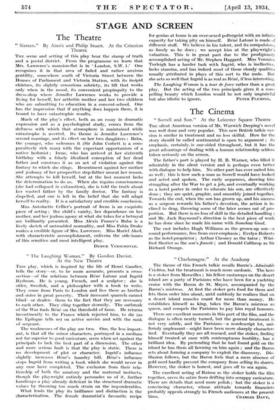"Charlemagne." At the Academy The theme of this French talkie
recalls Banie's Admirable Crkhlon, but the treatment is much more sardonic. The hero is a stoker from Marseilles ; his fellow castaways on the desert island are a party of Parisians who have been for a yachting cruise with the Baron de St. Mayer, accompanied by the Baron's mistress. At first the stoker gets food for them and lets them order him about, until suddenly he realizes that on a desert island muscles count for more than money. He establishes himself as king, takes the Baron's mistress as queen, and compels the Parisians to pay him royal honours.
There are excellent moments in this part of the film, and the dialogue is often neatly turned, but the general treatment is not very subtle, and the Parisians—a nondescript lot, uni- formly unpleasant—might have been more sharply character- ized. Eventually they are all rescued, and the stoker, finding himself treated, at once with contemptuous hostility, has a brilliant idea. By pretending that he had found gold on the island he has them all fawning on him again ; and the Baron sets about forming a company to exploit the discovery. Dis- illusion follows, but the Baron feels that a mere absence of gold need hardly prevent the company from selling its shares. However, the stoker is honest, and goes off to sea again.
The excellent acting of Raimu as the stoker holds the film together, saves its satire from drifting into scrappy caricature. There are details that need more polish ; but the stoker is a convincing character, whose attitude towards financiers probably appeals strongly to French audiences at the present
















































 Previous page
Previous page